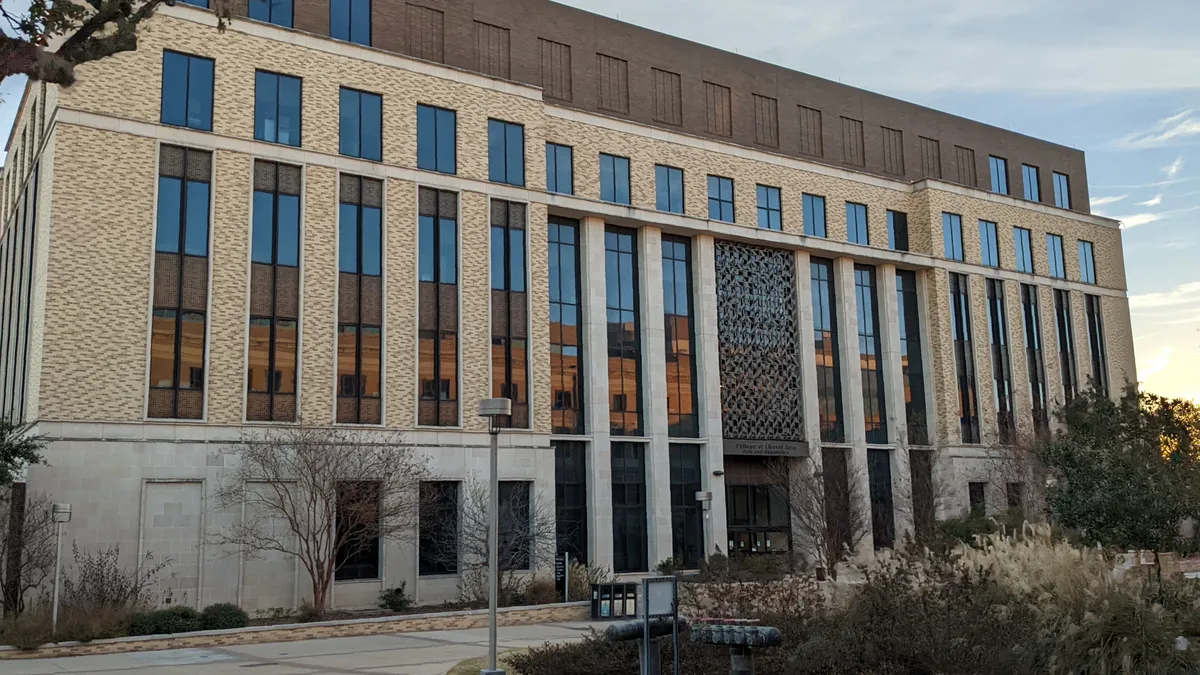Dive Brief:
- The Texas A&M University system's regents named a new interim leader of its flagship institution in a special meeting Sunday, just days after the former president resigned.
- Mark Welsh III has served as acting president of Texas A&M University since July 21, when then-President Katherine Banks resigned. The regents' unanimous vote solidifies Welsh's position to lead the institution in the longer term, a news release said.
- Texas A&M is experiencing extensive leadership tumult amid multiple scandals, one of which centers on the university's substantial weakening of a deanship offer to a prominent journalist — which led to her rejecting the offer.
Dive Insight:
Welsh has led the university’s government and public service school since 2016. On Sunday, he called this a time of transition for Texas A&M.
“As interim president, my primary focus is to ensure our faculty and staff have the resources and support they need to continue their critically important work," he said in a statement.
Welsh takes over the university at a turbulent time amid multiple scandals, one of which paved the way for his selection.
In June, Texas A&M announced it had hired Kathleen McElroy, a longtime journalist and tenured professor at the University of Texas, to revitalize its journalism program. But as McElroy's work on race in news media gained negative political attention, Texas A&M repeatedly weakened the terms of her hiring until she no longer agreed, according to The Texas Tribune.
McElroy, who is Black, told the publication that she felt “judged by race.”
The botched deal prompted the resignations of Banks, as well as that of José Luis Bermúdez, the interim dean who oversaw the journalism program.
During the same Sunday board meeting Welsh was confirmed, the regents authorized the system to negotiate a settlement with McElroy and to conduct a thorough investigation of the incident. The findings are to be released to the public upon completion, the board said.
A few days before the regents' action, Welsh acknowledged the challenges the university faced when Chancellor John Sharp appointed him acting president.
"Texas A&M has been in the news lately, and not for the reasons we would like," he said. "But recent events and the accompanying commentary do not define us as an institution, nor do they undo the great work we see across this university every day."
Texas A&M is also facing backlash from faculty and free speech advocates after it suspended Joy Alonzo, a pharmacy professor, for allegedly criticizing the state's lieutenant governor in a guest lecture on the opioid crisis.
Neither Texas A&M nor the University of Texas Medical Branch, where the guest lecture took place, would confirm what she said that prompted censure and an investigation into her comments, according to The Tribune.
The Foundation for Individual Rights and Expression, a national civil liberties watchdog, blasted the university's decision in a July 25 letter.
"Texas A&M’s punishment of Alonzo to please powerful political forces is a stunning abdication of its constitutional obligations, deeply chilling faculty and student expression on campus," the organization said. It called on the university to publicly renounce its investigation into Alonzo and to recommit to protecting faculty rights.
Alonzo was reinstated after the probe found no wrongdoing on her part, according to news reports.
The Academic Freedom Alliance, a faculty-run free speech nonprofit, also condemned Texas A&M's public castigation of Alonzo and alleged an apparent lack of due diligence when it decided to initially sanction her.
"Instead the university preferred to shoot first and ask questions later in order to mollify the sensibilities of powerful government officials," said Keith Whittington, founding chair of the group's academic committee, in a July 25 letter to Chancellor Sharp.
AFA urged university leaders to reassure faculty they will not be threatened with termination if they say critical things about state policies, especially when the policies align with coursework.














